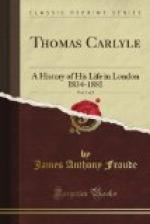|
This section contains 2,495 words (approx. 9 pages at 300 words per page) |

|
Thomas Carlyle, the essayist, historian, and philosopher of culture, was born in Ecclefechan, Scotland, the eldest son of a stern, puritanical stonemason. There can be little doubt that the often-hysterical extravagances of Carlyle's later social doctrines had a direct emotional origin in the Calvinism of his childhood. In 1809 he became a divinity student at Edinburgh University, but he soon stopped attending the university courses and read widely on his own in modern literature. After leaving Edinburgh in 1814, he taught school, at the same time broadening his already impressive span of reading. In addition to imaginative literature and German philosophy, Carlyle's serious interests at this time extended to Voltaire and François Fénelon, as well as to the scientific works of Isaac Newton and Benjamin Franklin. A reading of Edward Gibbon in 1817 immediately precipitated Carlyle's rejection of the Bible as a historical record and...
|
This section contains 2,495 words (approx. 9 pages at 300 words per page) |

|


